

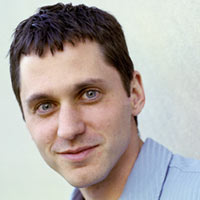
Side-stepping stereotypes: is fiction writer/mechanical engineer Karl Iagnemma extraordinary, or could most of us enjoy both artistic and scientific pursuits, if given the right encouragements? 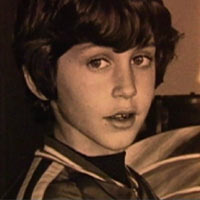
"I would guess that most roboticists were the kind of kids who were sitting underneath the covers in bed at night with Legos and a flashlight," says Iagnemma, no doubt reflecting on his own puckish pursuits. 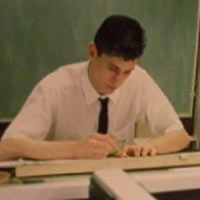
Portrait of the artist as a young man: who would have pegged this clean-cut engineering student as a writer of passionate fiction? 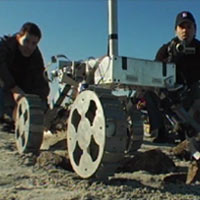
For Iagnemma, devising the mechanical systems and algorithms that allow a robot to navigate rough terrain requires "structured creativity," just like writing a novel. 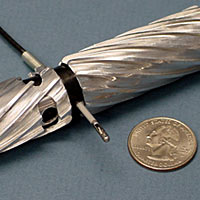
Prototype of a robotic surgical assistant, pioneered by Dr. Shane Farritor and fellow researchers at the Univeristy of Nebraska-Lincoln. Iagnemma is collaborating with them to make such robots adept at moving along the slippery surfaces inside a human body. 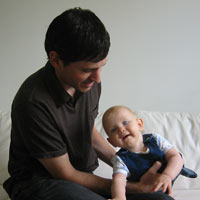
Sophia Liv, here 10 months old, made her entrance into the world as Iagnemma was wrapping up his first novel. 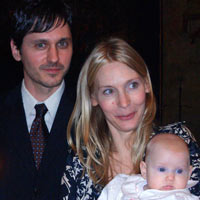
Given that Iagnemma's wife, Ann-Kristin, is a diplomat in the Swedish Foreign Ministry, their small family runs the gamut of art, science, and politics. |
Like Clark Kent, engineer Karl Iagnemma has a dual identity. By day, he designs robots at MIT. By night, he writes award-winning fiction. His short story "On the Nature of Human Romantic Interaction" is due to become a Hollywood movie, and he's just completed his first novel, revising much of it with his baby daughter asleep on his lap. NOVA scienceNOW spoke to Iagnemma (pronounced yan-YEM-ma) about fiction writing, robots that explore the human body, and how his life at MIT has changed since Brad Pitt took an interest in his work. Inspired DisciplineQ: How is building a robot, designing a machine to navigate Mars, like writing a novel or short story? Karl Iagnemma: Well, the creative process is quite similar in both research—I think any type of research—and writing. Both start with a blank page and progress through formulating ideas and concepts, to refining these ideas, to finally getting the details right. So it's a process of increasingly structured creativity. And I've found that you get the same "micro-satisfactions" when you get individual elements right, and you get the same rush completing a major research task and completing a story. It's an uncanny similarity. Q: People who don't write or don't know a lot of writers might consider it less rigorous than designing a machine. Do you think that's a common misconception? Iagnemma: A lot of people, when they think about writers, probably imagine people wasting time in cafés, drinking a lot and smoking too many cigarettes, and working when the inspiration—whatever that is—seizes them. But writing is rigorous. Writing, for me at least, takes a lot of concentrated work and effort. It takes dedication and the willingness to do the work even when that feeling of inspiration isn't there at all. Research is no different. You sit down and you work at a problem, you work at a problem, and you get nowhere, until finally one day the answer is there. But it wasn't a matter of inspiration; all the work you've done up to that point allowed you to find the answer. Q: Engineers tend to be people who like to solve problems. Do you ever solve problems completely as a writer? Iagnemma: No, I don't think you ever do. I can really, truly imagine working on the same piece for 20 years, because as a writer, you know that each time you do a draft you're making it a little bit better. Carried to its illogical extreme, you could do that forever and end up with one great work. You have to force yourself to give up and to move onto something else. That's the way you grow as a writer, by trying new things and tackling new subjects. But it's difficult. There's part of you that doesn't want to give up because you realize that in some way you're surrendering. Q: Is it hard to know when to stop rewriting a story, when enough is enough? Iagnemma: I think I've gotten better at recognizing when that point is. It's usually the point in the revision process where I'm changing commas to semicolons, and in the next draft changing the semicolons back to commas. That's a good sign. Scientist FictionQ: Does your best work as a writer draw on your experience as a researcher? Iagnemma: It definitely does. When I first started writing, I didn't write about scientists at all. I think I wanted a break from that part of my world. But when I did start writing about researchers, I found the work that came out was much better than anything I'd ever done. And I think it was because I had a real investment and interest and deep knowledge of the material, of some of the issues that drive these kinds of people. At this point, I can't imagine not writing about researchers, because I'm able to find a little bit of myself in every character I write about. And that's, I think, the key to good writing. Q: Would you rather write about science or scientists? Iagnemma: Oh, much more about scientists. I'm really not interested in writing about science at all. I mean, I try to get the information right, the details right. But fiction isn't good at conveying information. It's good at telling stories about people in interesting situations. Scientists as characters are interesting enough on their own without having to drag in quantum physics or any other science. The science, for me, is the furniture in the story. The scientists are the focal point. Q: But the science shapes who the characters are. Iagnemma: Yeah, exactly. Science and the drive to discover define who the people are. They couldn't be these characters without being scientists and researchers. But at the same time, to read a story of mine and hopefully to enjoy it, you don't need a physics or mathematics Ph.D. Q: Why don't more fiction writers write about science or scientists? Iagnemma: I can think of two reasons. First, a lot of writers were the kind of kids who, in high school, hated physics and hated chemistry and hated math for whatever reason. They were drawn to the English classes, and they're the ones who became writers. So many writers may not be interested in science at a fundamental level. There's also a perceived barrier to entry, a notion that you have to know a lot about science. But I don't think that's really true. To write about any subject, you have to learn a little bit. You often have to read a book or a couple of books on a particular topic. Writing an historical novel, as I've just done, you have to read about what life was like at a certain time period. And writing about science is no different. The scientists and researchers I write about are in lots of different fields—forestry, applied math, phrenology (which is a pseudoscience). I didn't know anything about many of those fields before I started these stories. I had to read papers and textbooks to try to understand what these scientists would know and how they might approach a problem. So, in some sense, I don't even have that much of a leg up over your average writer writing about scientists. But I still wonder why more people don't do it. I wish they would. Q: More competition, though! Iagnemma: True. Yeah, I've got a niche market here. Intriguing FailuresQ: Why are failed scientific endeavors interesting to you? Iagnemma: I think the heart of all fiction, or almost all fiction, is conflict. As fiction writers, we look for things that aren't going quite right. It's Tolstoy's line about happy families, you know? You can apply that to research. Failed research is what's interesting. When you fail at something it often forces you to question your own beliefs, what you thought to be true, and in extreme cases, to question who you think you are. And that makes for interesting fiction. An idea about a scientist in crisis is often the spark for me, and that spark tends to illuminate the story or the novel. Q: The protagonists in your stories have been described as people who "safeguard their emotions behind walls of logic and knowledge" yet "seek out the place where reason and passion peacefully coexist." Can reason and passion peacefully coexist? Iagnemma: They have to. Otherwise you'd have a lot of unhappy scientists in the world! It is one of the central questions of my fiction, this coexistence of reason and passion, and the points in life where reason and passion collide. Research is a great vehicle to investigate it, because you have, on the surface, this rational, analytical discipline. But you also have people who are so invested in the research, so wrapped up in it, that they become extremely passionate. It's an interesting dichotomy. Q: Scientists are generally a pretty rational lot. Do you think that this predisposition—a love of rationality and order—can be problematic when it comes to human relationships? Iagnemma: Not to generalize too much, but a common trait of analytical types, researchers, is that we try to systematize and rationalize and explain processes, because that's what we're trained to do. And that can, I think, be potentially problematic if you try to apply that same logic to your personal life, to relationships, to situations where it just doesn't work. I'm sure there are some folks who are like the character in one of my stories ["On the Nature of Human Romantic Interaction"] who would like nothing better than to write a system of equations to describe their relationship with a girlfriend or boyfriend or lover. But hopefully those folks are few and far between. Playing With RobotsQ: You seem like you are pretty happy to be a researcher. Why is designing robots fun? Iagnemma: It's kind of like being a kid and having the coolest toy you can imagine. I don't think it's at heart much more than that. You have these machines that can exhibit incredibly interesting and complex behaviors. And a by-product of that is they can also break in incredibly interesting ways. Studying these things, designing the hardware for robots, designing the algorithms that drive them is very satisfying and also a lot of fun. Q: Do you see a link between the way you played when you were a kid, the toys you liked, and your becoming a roboticist? Iagnemma: I would guess that most roboticists were the kind of kids who were sitting underneath the covers in bed at night with Legos and a flashlight. It's just a personality type. I was mechanically minded as a kid. I was taking apart the clock radio and all that stuff. As a high school student, I worked as a machine draftsman, and I worked on welding systems for automotive floor panels, which use robots. So even as a teenager I was exposed to robots, and I thought it was a very cool field. Q: Broadly, what are your main goals now as a researcher? Iagnemma: My main goal is to develop systems that can move effectively through very challenging environments. That requires a combination of clever design of robotic systems, their locomotion mechanisms, and algorithms to control the motion of the robots in an intelligent way. It doesn't take a lot to get robots to roll around flat floors in places like factories and hospitals. But if you want a robot to robustly move across the surface of Mars, for example, or move inside a human body during a surgical procedure, you need to think very carefully about how you design and control these robots. You don't want them stuck in the sand on Mars, or immobilized while moving across somebody's spleen. Q: Are you really designing robots to move through human bodies? Iagnemma: I'm collaborating with researchers at the University of Nebraska who came up with the concept of putting small, mobile robots inside the human body to assist surgeons in laparoscopic surgical procedures. I'm working on modeling the mobility of these systems. To get a wheeled mobile robot to move inside the human body is really tough, because the inside of the human body is very slippery and deformable. But if you do some analysis and you're careful about how you design these robots, you can get them to roll around, to look at the surgical site, and to send images either back to a surgeon who's performing the surgery right there, or potentially, in the future, to a surgeon who's located remotely. Q: Wow. So these machines would penetrate into a body sort of like an endoscope does? Iagnemma: Yeah, kind of like an endoscope. They could be inserted into the abdominal cavity through a small incision. Or, potentially, they could be inserted through a natural port and could work their way through the body to a surgical site. Q: So, for instance, if a soldier comes in wounded, and you don't know where the shrapnel is, these robots could help locate it? Iagnemma: Exactly. Trauma would be a good application. Surgeons could potentially try to evaluate the severity of an injury or dispense a coagulant or some other agent at an injury site. It's interesting work. It's a little bit—well, not futuristic, but ambitious and cutting edge. Q: Thinking about the future, would you want to see more robots in surgery rooms, driving cars, making breakfast? What are robots good for? Iagnemma: Well, I don't think robots are the solution to everything. Some people, if you gave them the chance, would have robots in every aspect of life, which could get a little bit creepy. But, generally speaking, any task that humans do that's dull, dirty, and dangerous—the three Ds—is potentially a good application for robotics. There are many tasks I can think of, from agricultural tasks to factory and assembly tasks, where robots have already been used a lot. You know, many people think driving a car is something that we'd be better off not doing. We could spend those hours more profitably doing something else. And I tend to agree with that. There's a lot of room for robots to be used in everyday life in the future. Q: Are robots smart? Iagnemma: (laughs) Robots are actually very dumb. The smartest robot today is no smarter than your average two-year-old. And robots today can only perform in environments that are very well structured, meaning that there's a well-controlled set of conditions, a set of defined inputs and potential outputs. So if you told a robot to weld a point on a car, a body panel, to within one millimeter tolerance, it could do that very easily. But if you put a robot in front of a stove and said, "Fry me an egg over medium," there's no robot today that could accomplish that task. The difference is that the welding task is very structured and frying an egg is very unstructured with a lot of uncertainty. Robots do not deal well with uncertainty. Having it Both WaysQ: Do you think that your robotics work and your writing satisfy different needs of yours? Iagnemma: Yeah, I think so. They're different forms of enjoyment. Human beings have this depressing property; they can become desensitized to even the most pleasurable things. For me, being stimulated in radically different ways is great. It's wonderful to be able to do such different things on a daily basis. Q: You have a very rich, full life. How do you balance fatherhood with your research and your writing? Iagnemma: It's tough. During the writing of my first book, I was neither married nor a father. So that was easy in retrospect. And during the writing of most of the novel that I just finished, I was married but not yet a father. So that was a little tougher, but not too bad. But I probably revised the last 100 pages of this novel with my daughter asleep on my lap. The good thing about writing is that it's very flexible, so you can choose the times when you want to work. I do most of my writing these days when my daughter is asleep, because I don't want to miss too much time when she's awake. It's difficult. But it just becomes a scheduling problem. Q: And an energy problem. Iagnemma: And an energy problem. But, you know, if you want to do it, there's time and energy for everything. Q: What would you rather have your baby girl say to you one day: "Dad, I want to be an engineer," or, "Dad, I want to be a fiction writer"? Iagnemma: Boy, talk about a double-edged sword! I kind of pray that she never comes to me and says she wants to be a full-time fiction writer, just because it's such a tough thing to do as a full-time profession, it's such a hard path. I hope she does write fiction, though. I hope she does it and takes all of the satisfaction that comes from it. If that's what makes her happy, I think it would be great. Q: What are you more exited about, the 2009 Mars rover mission or publishing your first novel? [Editor's note: Iagnemma and colleagues have grants from NASA to develop aspects of robot navigation for the next rover mission to Mars, scheduled to launch in the fall of 2009.] Iagnemma: Definitely the novel. The novel is something that I did all of. It's 100,000 words, and I wrote all 100,000 of them and put them in that particular order. The Mars rover mission is an incredible thing, and I hope that some of my software algorithms might eventually be a part of that mission. But there's a difference between a collaborative work and the work of an individual. And while a collaborative work can be satisfying, I don't think it can ever match the satisfaction that comes from creating something yourself and putting it out into the world and letting other people read it and hopefully enjoy it, and even be changed by it. Q: Does the novel have a title yet? Iagnemma: The title as of now is Godspeed, although that might change. That's the working title. Q: What's it about? Iagnemma: Well, it's a story set in 1844 about a scientific expedition in the upper peninsula of Michigan, which at that time was mostly Indian territory. And it's also a story about a father in search of his son, who's a member of this expedition. So it's two parallel storylines that come together at the end. It's a journey story, and it's also a coming-of-age story. Q: I've read that Brad Pitt has signed on to produce a movie based on one of the stories from your short-story collection. How has your life at MIT changed since your name was linked with his? Iagnemma: Not as much as I would like! No one's reviewing my technical papers more easily, or even holding the door open for me. But there are definitely folks who have read my book because they've heard that a movie might be made from it. The Brad Pitt phenomenon is a funny thing; when you put his name in a sentence next to yours, people start to take notice. Q: So, now that you have our full attention, I have a last, big question: do you have to choose between science and art? How do you manage to be both a successful researcher and a writer? Iagnemma: For me, as a young writer-slash-researcher, there was always a perception that I would have to choose between doing one or the other, that the research community wouldn't take me seriously if I was writing, and that as a writer there would be no time to have an intense day job.
But, you know, it's not true. There's time to do lots of things in life. And
doing research certainly doesn't mean that you can't also be an artist or a
musician or a writer or whatever else interests you. I hope that young people
who are studying science won't get the sense that that's all that they can do,
and that their minds will be closed to the arts.
|
“When you fail at something it often forces you to question your own beliefs, what you thought to be true...” “The smartest robot today is no smarter than your average two-year-old.” “As a young writer-slash-researcher, there was always a perception that I would have to choose between doing one or the other.” |
|||||||||
|
Interview conducted on June 28, 2006 and edited by Susan K. Lewis, editor of NOVA online |
|||||||||||
|
© | Created September 2006 |
|||||||||||